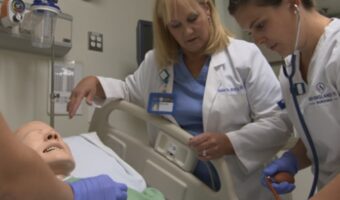Program Overview
With an associate degree in Respiratory Care, you’ll have the knowledge, skills, and technical expertise to pursue a fast-paced career as a highly skilled Respiratory Therapist (RT). Through a mix of classroom, lab, and hands-on clinical experiences, you’ll learn to assess, treat, and monitor patients with disorders of the cardiopulmonary system. As an RT, you’ll play an integral role in the development and execution of cardiopulmonary treatment plans for adult, pediatric, and newborn patients. RTs typically work under the guidance of a physician and perform a wide array of diagnostic and therapeutic procedures in a variety of healthcare settings like hospitals, rehabilitation centers, sleep disorder centers, wellness clinics, homecare agencies, and more.
Read More The Associate in Science degree program in Respiratory Care prepares students to pursue a career as a highly-skilled, critical thinking Respiratory Therapist (RT). RTs assess, treat, and monitor patients with disorders of the cardiopulmonary system. Practicing under the guidance of a physician, respiratory therapy program graduates will perform a wide array of diagnostic and therapeutic procedures on adult, pediatric, and newborn patients. You will treat various people and perform a patient assessment of each individual’s breathing patterns. Typical responsibilities for a respiratory therapist or RT include interviewing and examining patients with breathing problems, performing diagnostic and therapeutic modalities such as: A career as an RT means daily tasks in treating people. An RT must administer aerosolized medications, initiate mechanical ventilation, perform bronchopulmonary hygiene, maintain airway patency, and provide cardiopulmonary resuscitation. RTs play an integral role in the development and monitoring of a patient’s cardiopulmonary treatment plan. They utilize evidence-based medicine to educate patients, families, and the community regarding cardiopulmonary wellness, disease prevention, and management. Respiratory Therapists work in a variety of healthcare environments such as hospitals, long-term care facilities, rehabilitation centers, skilled nursing facilities, home care agencies, sleep disorder centers, clinical transport operations, physicians’ offices, wellness clinics, educational institutions, travel agencies, and medical equipment sales and service providers. Through the combination of classroom, laboratory, and hands-on clinical experiences, students will be provided the opportunity to apply their knowledge and create real-world understanding. Students who complete the Associate in Science in Respiratory Care program are eligible to sit for the National Board for Respiratory Care (NBRC) credentialing examinations. The NBRC examinations objectively measure essential knowledge, skills, and abilities required of respiratory therapists for entry into practice. Graduates who have passed the NBRC credentialing examinations can apply it to the state board of respiratory care in the state they choose to practice (currently 49 states require licensure). The NBRC exams do not need to be taken again once a student has passed the exam as long as the minimum number of Continuing Respiratory Care Education (CRCE) hours are maintained as required by the NBRC and state licensure boards. In addition, graduates of this program are eligible to continue on for a Bachelor of Science Degree in Business Management with a Healthcare Management/Respiratory Care (MGTH) concentration. Graduating with a degree in respiratory therapy helps you fulfill your dream to become a registered respiratory therapist. The right education and experience from a good respiratory therapy program will help you get the best employment opportunities, with the potential for job growth.Full Description
Potential Career Opportunities
Pursuing a degree in Respiratory Care will open the door up to careers including:
Certified Respiratory Therapist (CRT)
Registered Respiratory Therapist (RRT)
FAQ
-
Can you become a respiratory therapist with an associate degree?
A respiratory therapist can begin work after completing the 18-month associate degree program at NEIT. Many chose to continue their education by entering a bachelor’s or master’s degree program. Graduates must sit for a national exam to become a Certified Respiratory Therapist (CRT) and Registered Respiratory Therapist (RRT).
-
What is a respiratory care degree?
A respiratory care degree refers to either an associate or bachelor’s degree program designed to prepare students to assess, treat, and monitor patients with cardiopulmonary disorders.
-
What degree do respiratory therapists need?
Individuals may begin work as a respiratory therapist after earning an associate degree, passing credentialing examinations, and obtaining licensure in their state.



